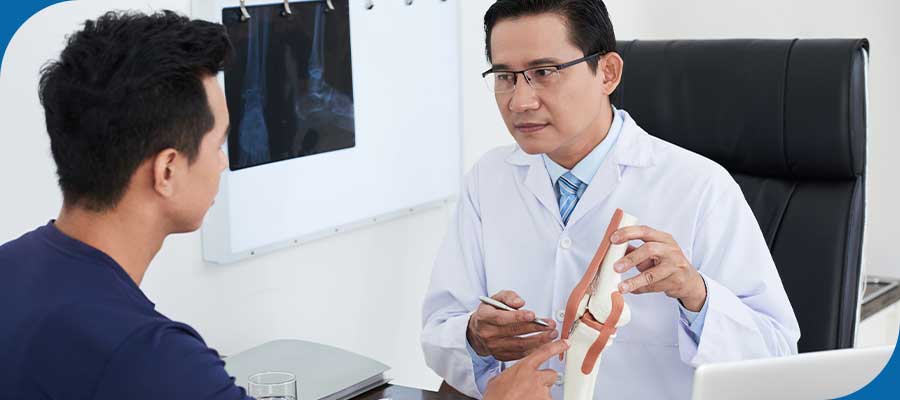Joint Injections for Chronic Pain Treatment Q&A
At Cape Fear Physical Medicine, we offer joint injections as an effective treatment for chronic pain. These injections are designed to reduce inflammation, improve mobility, and provide long-lasting pain relief. Tailored to each patient’s unique needs, our professional team uses advanced techniques to ensure the best outcomes. With a focus on personalized care, we help patients regain comfort and improve their quality of life. For more information, contact us or schedule an appointment online. We are conveniently located at 1540 Purdue Dr, Ste. 200, in Fayetteville, NC 28303.




Table of Contents:
What are some common causes of joint pain?
What are the different types of joint injections?
What are joint injections used for?
Are joint injections painful?
Pain can occur anywhere in the body, but it often affects areas of high mobility, such as the joints. There are many causes of joint pain, some more common than others, including arthritis, dislocation, and subluxation. Fortunately, some injections can specifically target chronic pain in painful joints to provide relief, improve mobility, and increase range of motion.
There are many causes of joint pain, some of the more common ones include:
• Adult Still’s disease
• Ankylosing spondylitis
• Avascular necrosis
• Bone cancer
• Broken bone
• Bursitis (joint inflammation)
• Complex regional pain syndrome
• Dislocation
• Fibromyalgia
• Gonococcal arthritis
• Gout (arthritis related to excess uric acid)
• Hypothyroidism (underactive thyroid)
• Juvenile idiopathic arthritis
• Leukemia
• Lupus
• Lyme disease
• Osteoarthritis (disease-causing the breakdown of joints)
• Osteomyelitis (a bone infection)
• Paget’s disease of bone
• Polymyalgia rheumatica
• Pseudogout
• Psoriatic arthritis
• Reactive arthritis
• Rheumatic fever
• Rheumatoid arthritis (inflammatory joint disease)
• Rickets
• Sarcoidosis (collections of inflammatory cells in the body)
• Septic arthritis
• Sprains
• Tendinitis
The different types of joint injections include:
• Corticosteroid Injections — Traditional injections, such as corticosteroids (also known as cortisone), can be effective as a way to quickly reduce levels of pain and delay the need for surgery.
• Hyaluronic Acid Injections — Hyaluronic acid (HA) injections often are used when corticosteroid injections are not effective, however, they usually are approved only for use in the knee. In some instances, doctors may consider HA injections first if there are no obvious signs of inflammation. Because corticosteroids have the potential to raise blood sugar levels, HA is often a better option for people with diabetes. HA acts as a cushion or a buffer against inflammatory cells in the joint, and in some cases, it can stimulate the knee to start naturally producing more HA. Some pain management doctors also believe that HA helps reduce pain by coating nerve endings within the joint, although this claim lacks clinical evidence. One treatment of HA injections (often one to three injections) usually offers symptom relief for four to five months; however, it can also provide relief for up to one year.
Joint injections have a wide number of uses, from treating pain to reducing inflammation. Typical uses include:
• To treat knee pain
• To treat elbow pain
• To treat shoulder pain
• To treat arthritis
• To alleviate pain caused by an injury
This list is not all-inclusive; there may be other uses for joint injections that are not listed here. For more information about the potential uses of joint injections, call Cape Fear Physical Medicine and Rehab today.
Joint injections are typically not painful when they include a local anesthetic and corticosteroids, however, some patients report feeling pain at the site of injection when receiving injections of other compositions.
At Cape Fear Physical Medicine and Rehab, our medical professionals are experienced at helping people find relief from their pain with joint injections. Contact us today or book an appointment and learn how joint injections can help alleviate your chronic pain. We are conveniently located at 1540 Purdue Dr, Ste. 200, Fayetteville, NC 28303. We serve patients from Fayetteville NC, Woodfield NC, Hope Mills NC, Fort Bragg NC, Eastover NC, and surrounding areas.

Additional Services You May Like
▸ Weight Loss & Wellness Program
▸ Botox for Migraine
▸ EMG Nerve Conduction Studies
▸ Epidural Steroid Injections
▸ Radiofrequency Ablation
▸ Rehabilitation Consultations
▸ Facet Injections
▸ Sacroiliac Joint Injections
▸ Joint Injections
▸ Genicular Nerve Blocks
▸ Prosthetic Evaluation/Management
▸ Adjuvant Therapy/Care
▸ Spasticity Management
▸ Stroke Treatment
▸ Multiple Sclerosis
▸ Spinal Cord Injury
▸ Traumatic Brain Injury
▸ Lifestyle Medicine
▸ Phentermine
▸ Qsymia
▸ Contrave

Additional Services You May Like
▸ Weight Loss & Wellness Program
▸ Botox for Migraine
▸ EMG Nerve Conduction Studies
▸ Epidural Steroid Injections
▸ Radiofrequency Ablation
▸ Rehabilitation Consultations
▸ Facet Injections
▸ Sacroiliac Joint Injections
▸ Joint Injections
▸ Genicular Nerve Blocks
▸ Prosthetic Evaluation/Management
▸ Adjuvant Therapy/Care
▸ Spasticity Management
▸ Stroke Treatment
▸ Multiple Sclerosis
▸ Spinal Cord Injury
▸ Traumatic Brain Injury
▸ Lifestyle Medicine
▸ Phentermine
▸ Qsymia
▸ Contrave







